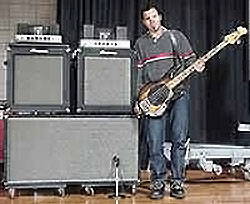
Don’t get me wrong, you don’t always have to agree with everyone, but you must at least hear them out for them to respect you enough to try that crazy idea you have about moving their guitar amp off stage.
Artists are an interesting breed, and most of the time don’t care what the technical reason is for an issue, they just want to know that you can handle it.
Most of the creativeness can be drained from an artist if you are unwilling to listen to suggestions and ideas they might have.
I think I have had good and bad relationships with artist because of my lack of listening. Isn’t it funny that we are supposed to use our ears for mixing but somehow we forget to leave them open for suggestion and requests?
Stage volume disagreements seem to be at the root of all evil in a lot of situations. The manner in which we react or don’t react to the stage volume issue could make or break a career.
I think we all could take a course in “professional banter” and learn a thing or two. I can’t tell you how many times I have seen engineers scream at the Guitar player to turn down or used some “cute” way to get their attention and then TOLD them to turn down.
I think one of the things artists and performers respect most is when you go to them to let them know the concerns you have about the problem you are having.
I truly believe that explaining the cause of the problem, and then what the result will be, in a polite yet professional manner, is the quickest way to move down the road so that we all can have a better day.
Any artist or performer worth a grain of salt will at least hear you out.
Don’t get me wrong – that doesn’t mean they are going to always agree with you, but most will have the common courtesy to at least consider the problem.
When faced with the consequences, I think you find that most will choose the best path for all involved.
With all of this said, please don’t forget that you are a large part of the progression of how the music reaches an audience and how it is made on stage. Please don’t let the “I’m the engineer” philosophy get in the way of being an asset to the performers.
